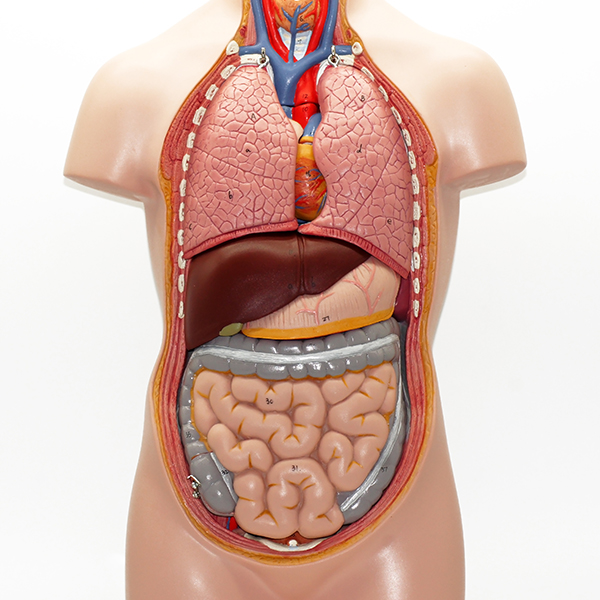The Large Intestine in TCM: A Gateway to Balance and Well-being
Centre of holistic Excellence
From a Traditional Chinese Medicine (TCM) perspective, the large intestine plays a crucial role in maintaining your overall health and well-being. It’s much more than just an organ that eliminates waste; it’s considered a *Yang organ, closely linked to the *Lung, its Yin partner. Together, they form a vital duo responsible for smooth elimination, efficient fluid absorption, and emotional harmony.
Here’s a deeper dive into the significance of the large intestine in TCM:
1. Connection to the Lung:
- The large intestine and lung are considered paired organs within the Five Elements system. They belong to the Metal element, symbolizing transformation, purification, and letting go.
- The large intestine meridian starts at the tip of your index finger and travels up your arm, shoulder, and neck, eventually connecting to the lung meridian. This close physical connection reflects their interconnected functions.
- A healthy lung facilitates efficient respiration, while a balanced large intestine ensures smooth elimination of waste products. Imbalances in one can affect the other, creating a domino effect on your overall health.
2. Main Root Syndromes:
- Constipation: This is the most common large intestine imbalance in TCM. It’s often attributed to Qi stagnation, dryness, or heat accumulation in the bowels. Symptoms include difficulty passing stools, abdominal discomfort, and bloating.
- Diarrhea: This can be caused by Qi deficiency, Dampness accumulation, or Cold in the intestines. It leads to loose or watery stools, abdominal cramps, and possibly nausea or vomiting.
- Excess Undigested Food: This refers to the feeling of having undigested food in your intestines, even after a light meal. It can be caused by weak digestive Qi or Dampness accumulation.
3. Balancing Diet:
TCM emphasizes food therapy as a crucial way to maintain a healthy large intestine. Here are some dietary tips:
- Eat a balanced diet: Include plenty of fresh fruits, vegetables, and whole grains to provide fiber and essential nutrients.
- Stay hydrated: Drink enough water throughout the day to keep your stools soft and prevent constipation.
- Limit processed foods, sugary drinks, and excessive red meat: These can contribute to Dampness accumulation and disrupt healthy digestion.
- Warm cooked foods are preferred over raw: They are easier to digest and less likely to create Dampness.
- Incorporate spices like ginger, cinnamon, and cardamom: These can help stimulate digestion and move Qi.
Remember: Individualized dietary recommendations are best tailored by a qualified TCM practitioner, at the Center of holistic Excellence, based on your specific constitution and imbalances.
By understanding the importance of the large intestine in TCM and adopting a balanced diet, you can support its optimal function and contribute to your overall well-being.
Additional Tips:
- Regular exercise: Gentle movement like walking, yoga, or tai chi can stimulate digestion and Qi flow.
- Manage stress: Chronic stress can disrupt digestion and gut health. Practice relaxation techniques like meditation or deep breathing.
- Get enough sleep: Sleep deprivation can weaken Qi and contribute to digestive imbalances.
By incorporating these practices into your daily routine, you can nurture your large intestine and cultivate a strong foundation for health and vitality.
It’s also very important to understand that the movement of bowel is also affected by the flow of qi of the liver and the governed by the overall health of the digestive system
Bowel movement is a complex process influenced by several factors, and your point about the liver and digestive system health is crucial in TCM.
Liver Qi and Bowel Movement:
- Liver Qi in TCM governs the smooth flow of energy throughout the body, including digestion. Stagnant Liver Qi can hinder the normal downward movement of Qi in the intestines, leading to constipation.
- Anger and frustration can stagnate Liver Qi, exacerbating constipation.
- Conversely, smooth Liver Qi facilitates the regular and effortless passage of stools through the intestines.
Digestive System Health and Bowel Movement:
- The Stomach and Spleen play vital roles in digestion and absorption. Weak Stomach Qi can lead to indigestion, bloating, and difficulty eliminating waste.
- Similarly, Spleen deficiency can affect the body’s ability to transform and transport nutrients, leaving undigested food residues in the intestines, contributing to constipation or diarrhea.
- Excess Dampness in the digestive system can also disrupt healthy bowel movement and contribute to various digestive complaints.
Holistic Approach in TCM:
TCM recognizes the interconnectedness of these organs and systems. Treating bowel concerns solely through the lens of the large intestine might not be enough. A holistic approach that addresses imbalances in the Liver, Stomach, Spleen, and overall digestive system is often necessary.
Treatment options in TCM for regulating bowel movement may include:
- Acupuncture: Stimulating specific acupoints can unblock Liver Qi, strengthen Stomach and Spleen function, and resolve Dampness.
- Herbal medicine: Individually tailored herbal formulas can address specific imbalances related to Liver Qi, Stomach Qi, Spleen deficiency, or Dampness.
- Dietary therapy: As you mentioned, adjusting your diet based on TCM principles can significantly impact bowel movement and digestive health.
- Lifestyle modifications: Managing stress, getting enough sleep, and regularly exercising all contribute to optimal digestive function and healthy bowel movement.
By addressing the underlying imbalances in the Liver, Stomach, Spleen, and the entire digestive system, TCM can help regulate bowel movement and promote overall digestive health and well-being.
Remember, consulting a qualified TCM practitioner at the Center of holistic Excellence is crucial for receiving a personalized diagnosis and treatment plan for your specific bowel concerns.
Self diagnosis can lead to further deterioration of your health.
